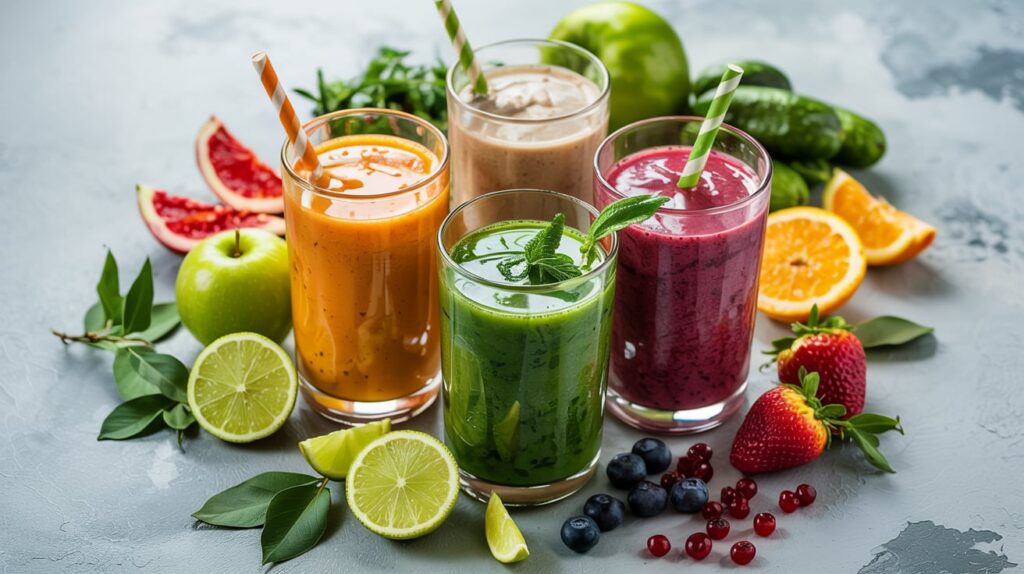
The 21-Day Smoothie Diet, developed by health coach Drew Sgoutas, is a structured meal replacement program designed to promote rapid weight loss and improve overall health. By replacing two meals per day with nutrient-dense smoothies, participants aim to reduce calorie intake while still obtaining essential nutrients. This diet has gained popularity for its simplicity and the promise of quick results.
Understanding the 21-Day Smoothie Diet
The core principle of the 21-Day Smoothie Diet is to replace two daily meals with specially formulated smoothies, while consuming one solid meal and two healthy snacks each day. The program begins with a three-day detox phase, during which all three meals are replaced with smoothies to jumpstart weight loss and cleanse the body. The diet provides 36 unique smoothie recipes, weekly shopping lists, and a day-by-day schedule to guide participants through the plan.
Benefits of the 21-Day Smoothie Diet

1. Weight Loss
One of the primary benefits of the 21-Day Smoothie Diet is weight loss. By consuming smoothies that are low in calories but high in nutrients, participants can create a calorie deficit, leading to weight loss. The diet typically provides around 1,500 calories per day, which can result in weight loss for many individuals. Healthline
2. Nutrient-Rich Meals
The smoothies are designed to be rich in fruits, vegetables, and other whole foods, providing essential vitamins, minerals, and antioxidants. This focus on nutrient-dense ingredients can improve overall health and support bodily functions.
3. Improved Digestion and Energy Levels
Participants often report improved digestion and increased energy levels while on the diet. The high fibre content from fruits and vegetables can aid in digestion, while the balanced nutrients support sustained energy throughout the day. fitlifehaven.com
4. Convenience
Preparing smoothies can be quicker and more convenient than cooking traditional meals, making it easier for individuals with busy lifestyles to stick to the diet plan.
Potential Risks and Considerations
1. Nutrient Deficiencies
While the smoothies are nutrient-rich, relying heavily on them may lead to deficiencies in protein, healthy fats, and certain vitamins and minerals if not properly balanced. It’s important to ensure that the solid meal and snacks complement the smoothies to provide a well-rounded diet.
2. Sustainability
The restrictive nature of replacing two meals daily with smoothies may be difficult to maintain long-term. Once the 21 days are over, transitioning back to regular meals requires careful planning to avoid regaining lost weight.
3. Satiety and Satisfaction
Liquid meals may not provide the same level of satiety as solid foods, potentially leading to increased hunger and the temptation to snack excessively.
4. Not Suitable for Everyone
Individuals with certain health conditions, such as diabetes or eating disorders, should consult a healthcare professional before starting the diet. The high sugar content from fruits in the smoothies may not be appropriate for everyone.
Tips for Success on the 21-Day Smoothie Diet
- Balance Your Smoothies: Incorporate a mix of fruits, vegetables, protein sources (like Greek yogurt or protein powder), and healthy fats (such as nuts or seeds) to create a balanced meal replacement.
- Plan Ahead: Use the provided shopping lists and meal schedules to prepare ingredients in advance, making it easier to stick to the diet.
- Stay Hydrated: Drink plenty of water throughout the day to support digestion and overall health.
- Listen to Your Body: Pay attention to hunger cues and adjust portion sizes or snack choices as needed to maintain energy levels and satisfaction.
- Consult a Professional: Before starting any new diet, especially one that significantly alters your eating habits, consult with a healthcare provider or registered dietitian to ensure it’s appropriate for your individual needs.
Conclusion
The 21-Day Smoothie Diet offers a structured approach to weight loss and improved nutrition through the use of nutrient-dense smoothies. While many participants report positive outcomes, including weight loss and increased energy, it’s important to consider the potential risks and ensure the diet is balanced and sustainable. As with any diet plan, individual results may vary, and it’s crucial to approach the diet with careful planning and professional guidance.